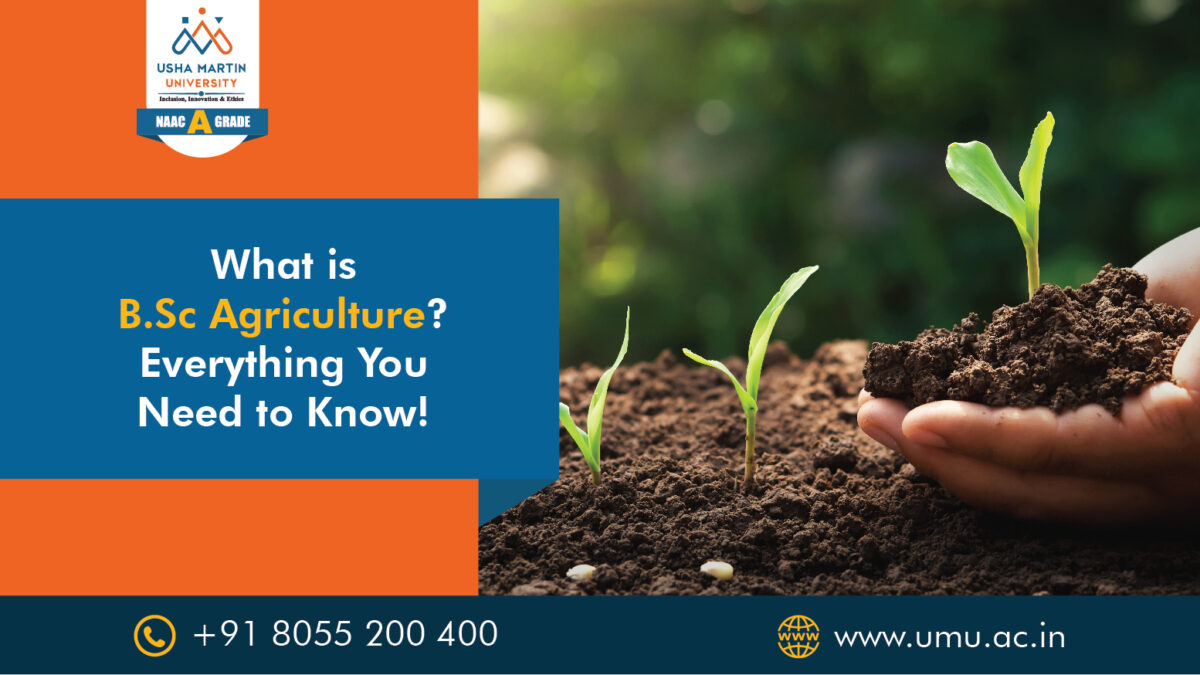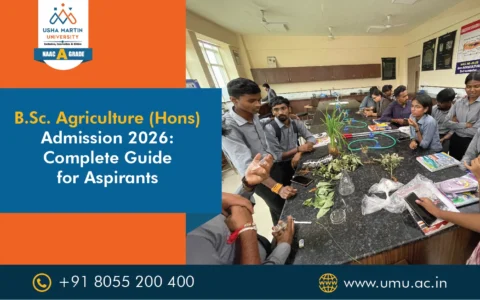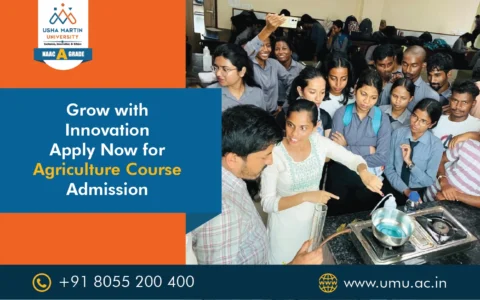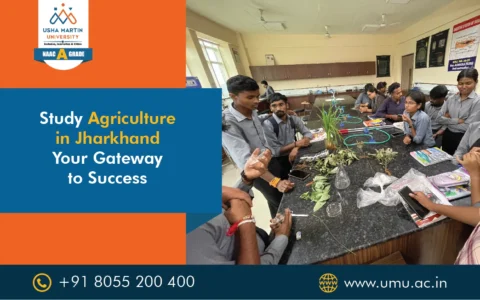
What is BTech Course? Everything You Need to Know About the Engineering Degree
June 25, 2025
Upgrade Your Skills with B.Tech Civil (Lateral Entry) – Apply Today
June 27, 2025Usha Martin University is considered as the top agriculture University in Ranchi that offers B.Sc. (Hons.) Agriculture as one of the top notch program. The B.Sc. (Hons.) in Agriculture has a course duration of 4 four (4) years and is divided into eight (8)semester. The course program is an unique blend of practical lab work followed by theoretical learning.
The course curriculum includes horticulture, plant genetics and breeding, soil science, microbiology, plant pathology, entomology, biotechnology, farm equipment, animal husbandry, agroeconomics, agrometeorology, post-harvest technologies, and agronomy, among other agricultural fields. Comprises practical instruction via labs, field excursions, workshops, group projects, internships, and case studies. Smart classrooms, well-equipped labs, experimental plots, connections to commercial farms, and a robust agricultural research acumen.
Eligibility Criteria:
Students must have completed 10+2 or senior secondary school examination with at least 50% in math, physics, chemistry, and biology. The university enrolls students based on the fulfillment of eligibility criteria.
B.Sc Agri Course Curriculum Overview –
Usha Martin University agriculture course syllabus according to UGC guidelines. The course bsc agriculture degree has a course duration of 4 years and the course program is divided into eight semester. During the 1st and 2nd semester ,some of the featured topics included are Basics of Agriculture, Science Foundation , Fundamentals of Horticulture , Fundamentals of Agronomy, Agricultural Heritage, Soil and Water Conservation , Fundamentals of Soil Science, Agricultural Meteorology, Fundamentals of Entomology, Principles of Genetics, Introduction to Forestry, Introductory Biology / Elementary Mathematics, Rural Sociology and Educational Psychology.
During the 2nd year of course duration the topic of study include Crop Production Technology (Kharif & Rabi Crops) , Weed Management , Fundamentals of Plant Pathology, Agricultural Microbiology, Principles of Plant Breeding, Production .Technology for Vegetables & Spices, Livestock and Poultry Management, Biochemistry, Farm Machinery and Power etc. The major focus is laid on the crop science and soil and plant health.
During the Year 3 (Semesters V & VI)
Core Focus: Specializations, Technology, and Management
- Breeding of Field/Horticultural Crops
- Agricultural Economics and Marketing
- Agricultural Finance and Cooperation
- Pests and Pest Control (Field & Horticultural Crops)
- Diseases of Crops & Their Management
- Post-Harvest Technology
- Protected Cultivation
- Seed Production Technology
- Agriculture Extension Education
- Agri-Informatics / ICT in Agriculture
- Soil Fertility and Nutrient Management
- Organic Farming and Sustainable Agriculture
- Farm Management & Production Economics
Year 4 (Semesters VII & VIII)
Core Focus: Hands-on Training & Industry Exposure
- RAWE (Rural Agricultural Work Experience)
- Involves staying in villages, studying real farming systems, and developing practical skills.
- In-Plant Training / Internship
- Experiential Learning Program (ELP): Choose specialization modules such as:
- Commercial Horticulture
- Food Processing
- Dairy/Poultry Enterprise
- Agri-business Management
- Mushroom Cultivation
- Seed Production
- Project Work / Report Writing / Viva
The agriculture course curriculum is based majorly on practical training that enables the students become ready for government tests, college coursework, research, and agribusiness endeavors. It also promotes comprehensive education in the fields of economics, engineering, soil science, plant sciences, and extension education.
Agriculture (B.Sc )Students Hosts Incense Cone-Making Workshop at Salhan Panchayat –
Career Scope after completing B.Sc.(Hons.)Agriculture –
After completing a Bsc hons agriculture course, you open doors to a diverse range of career opportunities across government, private, research, and entrepreneurial sectors. This degree blends science with practical knowledge, preparing you for multiple professional avenues.
There are various govt. sector jobs after completing B.Sc (Hons.)Agriculture viz. as an agriculture officer, assistant agriculture officer, field officer or block agriculture officer, soil conservation officer or jobs related to forest department can also be taken.
There are tremendous scope for higher studies and research work,one take further enhance their educational qualification by pursuing M.Sc Agriculture, Ph.d in Agriculture or can become Research Associate or scientist with ICMR,IARI,CSIR etc.
It is also to note that B.Sc (Bachelor of Science) Agriculture not only offers to excel through govt. jobs or by academia it also offers private jobs in food processing Industries ,in banking and finance sector as loan officer etc. The course program also holds international opportunities etc.
Why Pursuing B.Sc.(Hons.)Agriculture from Usha Martin University?
Usha Martin University (UMU), Ranchi, is increasingly recognized as one of the best universities in Jharkhand for pursuing a B.Sc. (Hons.) Agriculture program due to several key academic, infrastructural, and career-oriented strengths. Here are the top reasons:
- The B.Sc. Agriculture program at UMU integrates classroom theory with practical training, utilizing scientifically updated curriculum. extensive experience to agribusiness concepts, laboratory methods, and fieldwork.
- Orientation to research and experienced faculty Teachers contribute extensive knowledge of plant pathology, soil science, agronomy, and agrieconomics. Research projects, workshops, and journal publication are all encouraged for students.
- Well-equipped labs, greenhouses, experimental plots, smart classrooms, robust infrastructure, and learning resources. demonstration units and farms on campus for hands-on learning. Having access to agri-machinery training, irrigation systems, composting units, and soil testing labs .
- Outstanding Career Guidance & Placement Partnerships with private agro-industries, food processing facilities, and non-governmental organizations for internships and employment. Assistance for students who want to pursue further education or entrepreneurship (M.Sc.)
- Reasonably priced and value for money The university is renowned for providing affordable course programs with a competitive and clear cost schedule. Scholarships for deserving and underprivileged students are offered. Academic, lab, and hostel costs are made to be reasonable for both urban and rural students.
- The modern approach to education blends digital agricultural tools and technologies with traditional expertise. Give special attention to climate-resilient agriculture, sustainability, and organic farming. promotes interdisciplinary education by combining business, biological sciences, and technology.
Getting a B.Sc. with honors A wise and forward-thinking academic choice is agriculture, particularly in a nation like India where it is a vital economic sector. This four-year curriculum develops students into creative problem-solvers, entrepreneurs, and leaders in the agricultural ecosystem in addition to providing them with scientific knowledge and practical skills in crop production, soil science, and agribusiness.
Graduates of this program are prepared to pursue a variety of employment options in start-ups, banks, agriculture firms, government agencies, and research institutes. Additionally, they have excellent chances to pursue advanced degrees such as an M.Sc., or Ph.D., which can lead to jobs in academia, management, or science.
Choosing the right university, such as Usha Martin University for Bachelor degree further enhances the learning experience by providing quality education, field exposure, industry tie-ups, and career guidance, making it a transformative step for those passionate about agriculture and rural development.




